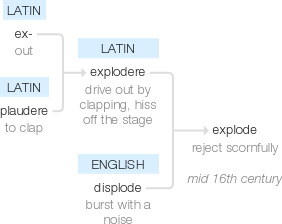Explode
mid 16th century (in the sense ‘reject scornfully’): from Latin explodere ‘drive out by clapping, hiss off the stage’, from ex- ‘out’ + plaudere ‘to clap’. explode (sense 4) is derived from the original sense of the word. explode (sense 1) (late 18th century) evolved via an old sense ‘expel with violence and sudden noise’, perhaps influenced by obsolete displode ‘burst with a noise’.
wiktionary
First recorded around 1538, from the Latin verb explōdere meaning to "drive out or off by clapping". The meaning was originally theatrical, "to drive an actor off the stage by making noise," hence meaning to "to drive out" or "to reject". From ex-(“out”) + plaudere(“to clap; to applaud”). In English it used to mean to "drive out with violence and sudden noise" (from around 1660), and later meaning to "go off with a loud noise" (from around 1790).
The sense of "bursting with destructive force" is first recorded around 1882.
etymonline
explode (v.)
1530s (transitive), "to reject with scorn," from Latin explodere "drive out or off by clapping, hiss off, hoot off," originally theatrical, "to drive an actor off the stage by making noise," hence "drive out, reject, destroy the repute of" (a sense surviving in an exploded theory), from ex "out" (see ex-) + plaudere "to clap the hands, applaud," which is of uncertain origin. Athenian audiences were highly demonstrative. clapping and shouting approval, stamping, hissing, and hooting for disapproval. The Romans seem to have done likewise.
At the close of the performance of a comedy in the Roman theatre one of the actors dismissed the audience, with a request for their approbation, the expression being usually plaudite, vos plaudite, or vos valete et plaudite. [William Smith, "A First Latin Reading Book," 1890]
English used it to mean "drive out with violence and sudden noise" (1650s), later "cause to burst suddenly and noisily" (1794). Intransitive sense of "go off with a loud noise" is from 1790, American English; figurative sense of "to burst with destructive force" is by 1882; that of "burst into sudden activity" is from 1817; of population by 1959. Related: Exploded; exploding.
